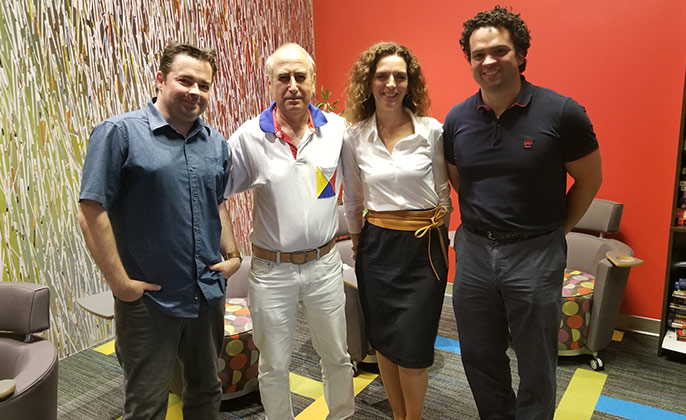What better way to start the first post in the “CPAs” series than with a world-class lady. Angelique Koopman, Partner Audit Innovation at Baker Tilly Berk, has been following MindBridge since our early days and recently visited our office. We could not resist asking her a lot of questions.
In this series, we will interview various CPAs in the profession as we travel across the globe, asking them for their opinions and personal stories. If you ever would like to share your own experience as a CPA, please do not hesitate to reach out directly.
Solon: Where do you think analytics and artificial intelligence (AI) would be the most useful in the audit process today?
Angelique: Planning and risk assessment are often based on professional judgment. And what I would like to see is the use of more data analytics in the planning phase of the audit so we can substantiate our considerations and our risk assessments with facts (quantitative data). This way we are collecting evidence to support our risk assessments early on.
Solon: So how should we address that deficiency, and what impact do you think it has during the audit process? What surprised me recently is that there are firms that do it in the review phase, then they miss something, and they have to go back. If you do integrate next-generation AI systems in the planning phase, do you think it would help to decrease this need to re-do portions of the audit?
Angelique: Yes, when you are doing your risk assessment or your planning, it’s better to have a set of preliminary analytics based on facts. That way, you can substantiate the choices you make which can help you decide to perform all the procedures or just a subset of procedures. Right now, we do risk assessments to limit the audit work. If you do not plan your audit well enough, at the end of an audit, you will find that you missed something somewhere and then you have to go back and do additional work, and I believe this is one of the best arguments for using analytics more in the planning phase.
Solon: At the end of the day, is it just about analytics, or are there other industry best practices we can also be including?
Angelique: It is the combination. It’s a combination of automating rigorous procedures and it’s about automating specific aspects related to the industry. I strongly believe in an industry driven approach. It is more of the rule-based part using the industry expertise. But I also believe that analytics must be used in combination with the auditor with all his knowledge and the holistic view of the client. Giving the auditor the technology to do better, to improve professional judgment, to improve decisions based on intuition or feeling and to substantiate those decisions more comprehensively. That is really important. To be honest, I don’t believe in just having a tool or platform only, because, in the end, an auditor needs to evaluate the outcome. But what you can do is help the auditor from performing tedious tasks that could otherwise be automated. Such tools provide the auditor with more insights and knowledge such as making cross-references and analyzing data from more than one dimension. What we normally do with audit analytics, is that we have a question, then we build the query and the query gives an answer that’s different, so I believe in the combination of both analytics and best practices in combination, that it will help auditors become more focused on delivering better results.
Solon: There is a lot of confusion over the role AI plays in the audit. What would you tell a traditional audit partner who is evaluating if he/she should leverage machine learning and artificial intelligence (AI)?
Angelique: Mostly when people hear about AI, they believe that it is science fiction. And they might think it is in the preliminary stage and are not aware of the fact that nowadays lots of things in our society are run by algorithms. We use them everywhere. Unfortunately, we are not using it in the audit on a large scale yet. Maybe, we think it is scary. However, when we get into a plane, we fully trust the airplane, but in the audit world, we do not trust algorithms yet. Basically, it’s about combining statistical methods with machine learning. So I think they need to know what machine learning is and how it works. We have to explain it with simple examples, like how does a program operate and learn? As an example how to identify a cat from a picture? In fact, AI is about automating tasks that are beyond the capacity of human beings. Machine learning is a way of making complex analysis possible. Automating repetitive audit tasks makes even greater business sense when you combine it with machine learning and AI algorithms.
Solon: People talk about the robot taking the job of an accountant…
Angelique: It’s very similar to the team that supports you when you are auditing a bank, and the bank has financial instruments, and you have team members who are specialized in that type of audit; they have the know-how of the financial instruments. Or when you are auditing a real estate company, you use the expertise of people who know that space, you cannot do it by yourself. It’s only expertise enshrined in a computer program. That’s the difference.
I was telling Robin and Eli, knowing that this technology is here, and at this point, it would be hard to go back to audit and do the role I used to do without leveraging this technology. I can clearly see the value it adds, I can do a manual sample, but recognizing that with AI I can sample the whole ledger with a higher degree of assurance. And given that it is my signature on that audit statements, I want to do the best job with the best tools available.
Solon: So using artificial intelligence (AI) is going to become a matter of professional integrity?
Angelique: I think, this is something in the audit community which is starting now. And I gave the same message at a recent conference in Belgium. People start to think about it, and they are starting to say, “Yes, why not? Change is coming!”
Originally posted on Solon Angel’s Linkedin post




